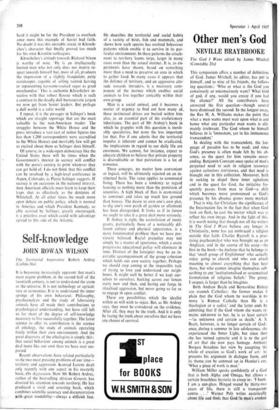Self-knowledge
JOHN ROWAN WILSON
It is becoming increasingly apparent that man's most urgent problem, in the second half of the twentieth century, is not to understand the atom or the universe. It is not technology or agricul- ture or economics. It is to understand the inner springs of his own behaviour. Philosophy, psychoanalysis and the study of laboratory animals have all made their contributions to psychological understanding, but have still left us far short of the degree of self-knowledge necessary to live successfully together. The latest science to offer its contribution is the science of ethology, the study of animals operating freely within their own environment. And the great discovery of the ethologists is simply this: that social behaviour among animals is a great deal more like our own than we have ever sus- pected.
Recent observations have related particularly io the two most pressing problems of our time— territory and aggression. Konrad Lorenz dealt only recently with one aspect in his masterly book, On Aggression. Now Mr Robert Ardrey, author of the best-selling African Genesis, has directed his attention towards territory. He has produced a vivid and arresting book, which combines scientific accuracy and documentation with-great readability—always a difficult feat. He describes the territorial and social habits of a variety of birds, fish and mammals, and shows how each species has evolved behaviour patterns which enable it to survive in its par- ticular environment. In these patterns the attach- ment to territory looms large, larger in many' cases even than the sexual instinct. It is, as ex," periments have shown, based on something more than a need to preserve an area in which to gather food. in many cases it appears that the defence of territory, and an aggressive atti-r tude towards intruders, is a necessary com- ponent of the instinct which enables social animals to live together amicably within their own group.
Man is a social animal, and it becomes a matter of urgency to find out how many ot, these instinctual drives are buried within him also, as an essential part of his evolutionary inheritance. The part of Mr Ardrey's book in which he grapples with this question is inevit- ably speculative, but none the less important for that. For if one admits that the territorial impulse is inherent and cannot be eradicated, the implications in regard to our daily life are enormous. We cannot, for instance, expect to educate children to believe that private property is discreditable or that patriotism is a lot of nonsense.
These concepts, no matter how convenient or logical, will be ultimately rejected on an in- stinctual basis. The same applies to communal living. There has been a tendency to regard housing as nothing more than the provision of amenities. A high block of flats is economical to construct and takes up much less ground than houses. The desire to own one's own plot, to dig one's own patch of garden or allotment has been disregarded. It looks as if in future we ought to take it a great deal more seriously.
If Ardrey is right, the assimilation of immi- grants, particularly those of a noticeably dif- ferent culture and physical appearance, is a more fundamental problem than we have pre- viously believed. Racial prejudice may not simply be a matter of ignorance, which a more progressive educational policy will eliminate in time. Distrust of the foreigner may be an in- evitable accompaniment of the group cohesion which holds our own society together. Perhaps we should stop aiming at the impossible task of trying to love and understand our neigh- bours. It might well be better if we kept our- selves to ourselves, barking across our fences every now and then, and baring our fangs in ritualised aggression, but never going so far as to engage in open conflict.
These are possibilities which the idealist within us will wish to reject. But, as Mr Ardrey says, they must be considered on the evidence. After all, they may be the truth. And it is only by facing the truth about ourselves that we have any chance of survival.






























 Previous page
Previous page